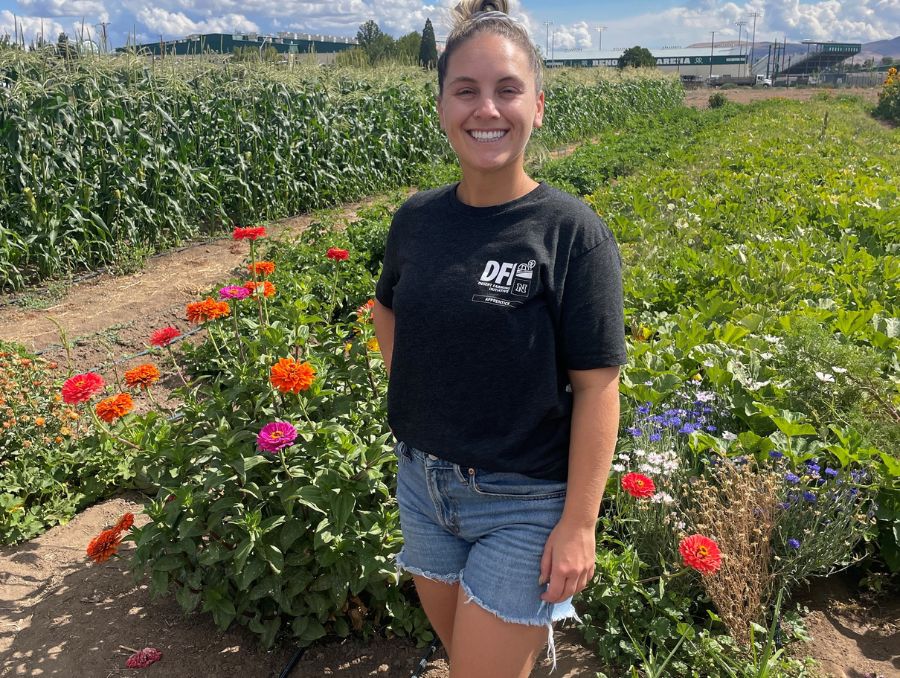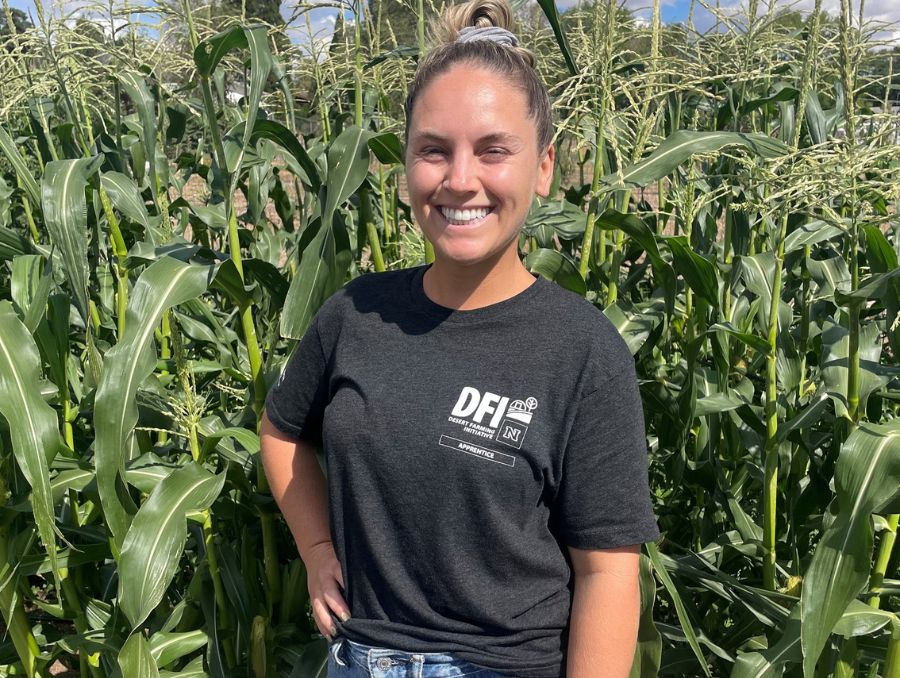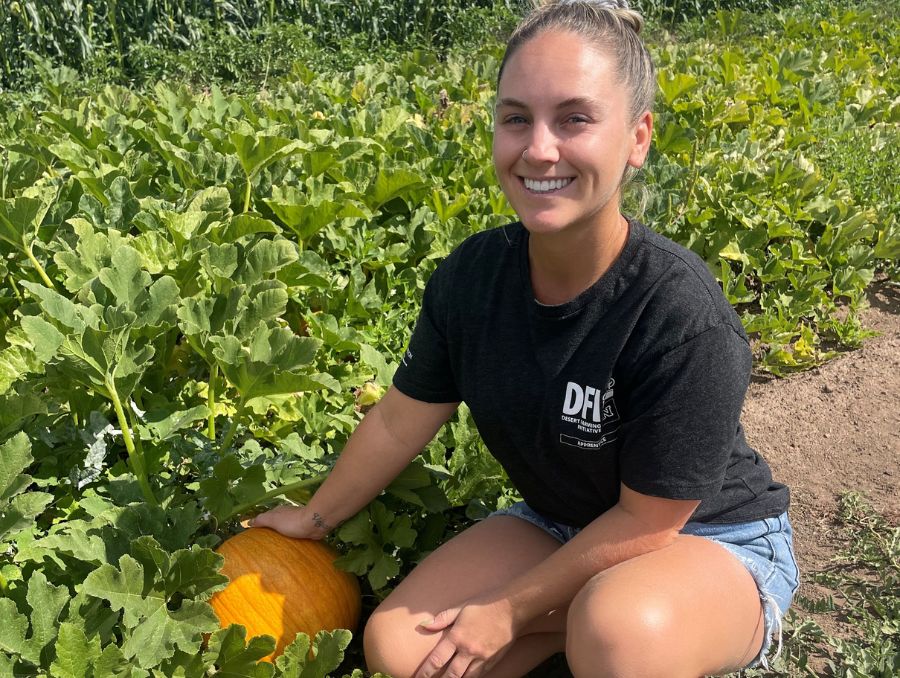Monica Mori is obviously an optimist. An aspiring farmer, she relishes learning about growing things outside in Nevada’s challenging climate.
“I like doing desert farming outside, not really in hoop houses, using what Nevada has to offer in the outdoor space,” she said. “I just want to utilize the space and grow with the sun shining down. I like the challenge of that. I think it’s really cool to see how garlic, pumpkins and corn grow really well here. I like to see and use what thrives here, and I’m excited to learn more about that.”
The Apprentice – Nevada style: University and growers work together
Mori has spent the last year learning about growing in Nevada – in hoop houses growing lettuces and greens during the winter, in greenhouses and nurseries starting seedlings and grafting tomato plants in the spring, and the highlight for her – “open-field” farming, being outside planting, farming and harvesting in the summer and the fall. It was all part of her experience as an apprentice of the Nevada Farm Apprenticeship Program, a University of Nevada, Reno program based at its Valley Road Field Lab in Reno.
Part of the University’s Desert Farming Initiative (DFI), the program provides a stipend to aspiring farmers who apply to spend a year filled with classroom education from faculty, mentoring from University faculty and staff and local farmers, and hands-on experience. The program, part of the University’s Experiment Station unit, aims to promote long-term viability of Nevada's agricultural industry and resiliency of the state's food system. It was made possible by a grant from the USDA Regional Food Systems Partnership Program and support from the Nevada Agricultural Foundation.
Mori applied for the USDA-funded program over a year ago, began it last fall and is wrapping up that portion of the program this month. During her apprenticeship, Mori contributed to the production of thousands of pounds of produce sold at local farmers markets and at the Great Basin Community Co-op, and provided to local food pantries, including the University’s food pantry, Pack Provisions. The revenue from those sales goes right back into the Initiative’s farm training programs.
But, after discovering that her passion is open-field farming through her apprenticeship this summer, Mori applied to stay on for another year as part of the program, to run her own “incubator space,” a one-acre plot at a local farm, and start and develop her own business, Pumped Up Porches, a fall porch-decorating business using farm produce. She aims to decorate porches with items that are beautiful, edible and provide seeds for future planting, such as pumpkins that can be used for pies and seed saving when it’s time to take the decorations down.

“This summer, it got more focused out on the farm, and I started to go out in the field more,” she said. “That was really exciting because I really started to learn about that. I learned how to run the tractor, which was fun. There were way more people on the farm too. Summer is just so exciting. We were doing pumpkins, corn, potatoes and melons.”
Mori enjoyed the camaraderie and mentorship she experienced during her apprenticeship, especially when summer rolled around.
“Going into a farming apprenticeship, you could be nervous, especially as a female,” she said. “But, Garrett, Jill and everybody at DFI, they are like a dream team to work with. If it weren’t for that, I don’t know that I would have lasted. I learned way more about a lot of different things than I had originally wanted, but in the best ways. It has been an eye-opening and honest experience.”
Along with Garrett Menghini, the Initiative’s farm production manager, and Jill Moe, the Initiative’s director, Mori also credited Todd Rissone, a local farmer with decades of experience, for keeping her motivated out on the farm.
“Todd really lifted my spirits when he came here in May,” she said. “The winter was really hard, and he just brightened my world. He’s an angel. He’s really knowledgeable and patient. He took me out to Avanzino Farms in Reno and showed me how to run a larger-scale irrigation system because I was almost too scared to do the incubator program due to the irrigation aspect. But, he showed me how.”
Rissone went through a farm apprenticeship program at UC Santa Cruz, and part of that program is that apprentices commit to help other new farmers down the road. Rissone is now fulfilling that commitment by helping out as a farm technician and mentor at the Initiative. The University’s Extension unit helps fund that portion of the program, through its federal USDA Beginner Farmer & Rancher Program grant.
“Monica really took full advantage of the mentoring offered by Todd and other producers,” Moe said. “She brought an independent and practical approach to her work. while taking initiative to collaborate with mentors and build a support network.”
Mori said she also learned a lot from Felipe Barrios Masias, associate professor focusing on agronomy, and other faculty in the University’s College of Agriculture, Biotechnology & Natural Resources.
“He just taught me so much about horticulture and provided me with the basics I needed to know to tackle all the different types of farming I got to experience,” she said.
Mori said that her experiences in the apprenticeship and talking with local producers helped her more clearly define her goals and path in agriculture.
“When I entered the program, I kind of had a big vision of becoming a vegetable farmer and part of the food system and was interested in organic farming,” she said. “Throughout the year, my goals changed multiple times. I found out I like farming some things and don’t like farming other things. We would have farmer lunches once a month where we got to talk with farmers. They would ask: ‘What is your why? What makes you happy about farming?’ It made me think about it. I love working outdoors in the field, I love fall, and I want to be a part of that scene.”
Experience at partner farm evolves into incubator opportunity
Also as part of the apprenticeship, during the last six months of the program, Mori spent one day a week with a partner farm, Lattin Farms, where she got to work alongside Lisa Lattin Voiglaender and her husband Ryan. Mori has now decided to do her incubator program at Fallon Farms, leasing an acre of their property to run as her own business, where she will grow produce to sell as well as to provide the produce needed for her Pumped Up Porches fall porch-decorating business next fall.
“I chose Lattin Farms because I live in Fallon, and I want to farm there,” she said. “It ended up being the best decision I ever made. I learned a lot about the open-field larger farming that I was interested in. It was good to get that diverse outlook.”
As Mori wraps up her apprenticeship this month, she also plans to work at Lattin Farms for a couple of months to help with its fall festival.
“They need help with the festival, and I want to learn about the agritourism side of things. I’ll start going into my business and incubator program right after that, with seed starting and other things I need to do this fall and winter.”

With help from Kelli Kelly, advisor at Small Business Development Center at the University, Mori has already developed a business plan and launched her Pumped Up Porches business. She has even signed up a couple of customers, including the Fallon Chamber of Commerce. This fall, she is buying some of the produce that she has helped produce at the University, as well as sourcing products from local producers, for her fall porch-decorating business.
“Next year, I’ll be growing most of what I need myself, at my space at Lattin Farms,” she said.
Her business and crop plan calls for planting a variety of corn and pumpkins, as well as some onion and garlic, since part of the program calls for 25% of her product going to local food banks. She said she may also sell some of her produce to others, and she is going to test growing some flowers in the field for bouquets and to add as dried flowers for her porch decorations. She is also going to test growing some mums to sell as potted plants.
“Monica has formulated a clear path for success and has the capacity to substantively contribute to Nevada’s food system,” Moe said. “We are so excited to see her business take off.”
From plucking dragon fruit in Hawaii to producing pumpkins in Nevada
Mori’s path to pursuing a career in agriculture in Nevada took the unlikely route of a stint in Maui, farming dragon fruit.
“I grew up in northern Nevada, with ranching in my blood,” she said. “But, I really cut my teeth in farming in Hawaii. And yeah, farming in Hawaii and farming in Nevada couldn’t be more different,” she chuckled.
Mori’s grandfather had a ranch and dairy farm in Yerington, where she also spent part of her childhood and where her sister and brother-in-law have a ranch and run a farmers market. Mori graduated from Reno High, spent a year as a student at the University, then did short stints in Oregon and Alaska before landing in Hawaii, where an opportunity to go “WOOFing” drew her attention. WOOFing is going to work at “Worldwide Opportunities on Organic Farms.”
“It’s like a work exchange,” she said. “You do organic farming, and you get room and board. WOOFing is really what got me hooked on farming. It was on a dragon fruit farm, that also had pineapples, bananas and other tropical fruit.”
After WOOFing for about eight months, Mori stayed in Hawaii, working in the service industry and as a visual merchandiser for Tommy Bahamas, for eight more years before deciding to return to Nevada. That visual merchandising experience is being put to use now, with her Pumped Up Porches fall porch-decorating business, but a lot closer to home – and family.
“I just started to miss my family,” she said. “My sister started having kids, and that’s what prompted me to move back.”
Shortly after moving back, Mori met her husband who grew up in Fallon. She and her husband have lived there for the past three years, where her interest in agriculture was once again sparked by her father-in-law, who grows fruits and vegetables in hoop houses and outside there. While she has been further developing her knowledge and skills in agriculture, she also has been putting to use her experience in the service industry to run her own business, Tumbleweeds Boba, where she sells coffee, tea and boba at pop-up tents at local events.
“I’m also kind of looking at eventually trying to tie in some things, like growing raspberries for raspberry syrup for my boba business. I’ve imagined opening a boba shop where I can offer things grown on my farm. I worked in restaurants a lot in Hawaii. I think about growing things to supply my own restaurant at some point. I’m open to the journey, wherever it goes. Farming is not easy. It’s really hard. You really have to want to do it, or you’re not going to last.”
















